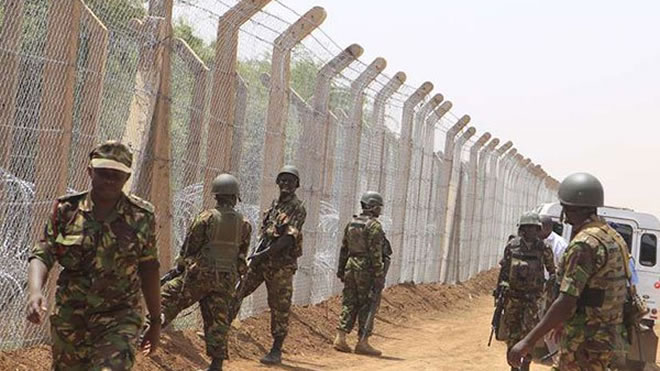
By MANASE OTSIALO
Tuesday June 26, 2018

When Kenya closed its border with Somalia in 2014, most Mandera County residents thought it was a short-term measure to curb Shabaab terror attacks.
This, however, was not to be the case.
Besides the restricted movement of people and goods, the continued closure of the Kenya-Somalia border has affected legitimate businesses in the town.
This has raised the cost of goods and reduced revenue earnings for the county.
Hassan Ali Hassan, a businessman in Mandera town, says the local community has paid the price of the move through loss of their business.
Before 2014, most businesses in Mandera and Elwak, the two major commercial centres in the vast county, relied on Mogadishu for supplies.
“We used to import goods for our shops from the Kismayu port in Somalia and paid tax at the main points in Mandera town and Elwak,” he said.
“It is only 600 kilometres to Mogadishu from Mandera unlike the 1,200 kilometres to Nairobi to get supplies for our shops,” he said.
Goods from Somalia are cheaper compared to same merchandise coming from Nairobi.
Mandera, Somalia’s Bulahawa and Ethiopia’s Suftu are conjoined towns that tell a story of same people, same culture but different states.
“Closing the border opened an avenue for police to make money from imports coming in through dubious means,” says Mr Hassan.
At Border Point Two and Three in Mandera, police officers man unauthorised entries but movement of people and loaded donkey carts are high.
There are no revenue offices at the Kenya-Ethiopia border. The place has been left in the hands of police reservists due to low business activities.
The main entry and exit point in Mandera town remains idle, with trans-border activities shifted to the unauthorised entry points.
A donkey cart carrying several bags of sugar, cartons of powder milk or rice are allowed after the transporter pays a fee to the police officers.
A regular transporter in Mandera, speaking on condition of anonymity, tells this reporter that owners of a full donkey cart pay Sh10,000.
“It is expensive doing business at the border currently because after paying the officers at the point, another group of police officers will come to your store and demand their share,” he says.
Ms Halima Jimale, a businesswoman, says Mandera depends on Bulahawa for 90 per cent of its supplies as it gets duty-free goods from Kismayu port.
“We used to trade in hides and skins, forex exchange through hawaalas (money transfer system), milk and fuel but that is history now since the border was closed,” she said.
She said the closure only exists on paper since business has remained the same at the illegal points.
Mr Mohamed Adan Khalif, the Speaker of the Mandera County Assembly who served as Mandera Township councillor (1998-2013) and as chairman of the local town council, says it was normal business before the border was closed.
“Before the border was closed, we used to collect good revenue without any problem but currently every business is complaining because the environment has become difficult,” he said.
Mr Khalif could not remember how much the local authority was collecting then but says locals were more than willing to pay tax.
Reopen border
Mandera Governor Ali Roba has urged the government to reopen the closed border for resumption of legitimate cross-border trade.
He argues that cost of transportation of products from Nairobi to Mandera are exhorbitant compared with getting them from Somalia.
“Until we are able to industrialise Mandera, then we shall remain dependent on where we can get affordable goods for our population,” he said.
He gave an example of a bag of cement, which in Mandera is double the price that it costs elsewhere in Kenya due to transportation costs.
“It costs a trader Sh200,000 to hire a 20-tonne truck to transport 400 bags of cement from Nairobi which is sold at Sh1,000 here to recover the expenses,” he said.
Ethiopia supplies Mandera a bag of cement at Sh650 while the same from Nairobi goes for Sh1,100.
The governor says to address the high costs of transportation of goods from Nairobi, the government, in conjunction with World Bank, is planning to tarmac the Mandera-Isiolo road.
“Before this road is done, we must trade with Somalia after President Uhuru Kenyatta directed the re-opening of a customs border here and all needed offices must come to Mandera,” said Mr Roba.
Mr Roba says illegal goods have continued to flow, encouraging corruption among security forces in Mandera.
The governor insists that the economy of Mandera depends on Somalia and Ethiopia and opening the border will help grow the county.
Mandera finance executive Ibrahim Barrow says the county has underperformed in revenue collection since 2013.
“We are unable to track what comes in and tax it from main stores in town since the border was closed creating illegal entry of goods,” he said.
Mr Barrow says costs of foodstuff and electronics is cheap in Mandera because transporting goods from Mogadishu is cheaper compared with Nairobi.
He suggests that a customs office be built in Elwak to control business between the area and Somalia’s Borache.
A plan to build a border wall, mooted by the government in 2015 to control human movement and commodities by defining entry and exit points, has since stalled.
Only eight kilometres of the 270 kilometres stretch has been fenced by the military personnel and a local contractor.
National Youth Service staff deployed in Mandera for project abandoned the project citing lack of payments